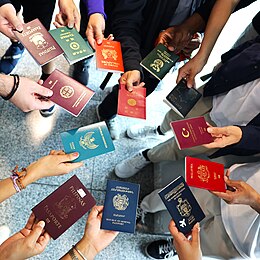
By: Sultan Usman
Visa on Arrival: A Welcome Gesture or Backdoor Bureaucracy?
In an era of increasing globalization, visa policies play a crucial role in shaping diplomatic relations and international mobility. Yet, recent developments—such as Canada’s visa denial to Nigeria’s Chief of Defence Staff and other top military officials—have reignited discussions on the complexities of visa approvals and rejections.
While some countries have introduced Visa on Arrival (VoA) schemes as a gesture of openness, many travelers find themselves caught in a web of bureaucratic hurdles, raising questions about whether VoA truly facilitates seamless travel or serves as a masked layer of vetting and restrictions.
As FactCheckAfrica continues its explainer series on visa processes and policies, this piece explores the reality of Visa on Arrival: Is it a progressive step towards borderless travel, or just another diplomatic tool subject to hidden conditions and selective enforcement?
Visa on Arrival (VoA) is often presented as a diplomatic compromise—acknowledging that a traveler is not an immediate security risk while still maintaining a layer of immigration control. Unlike visa-free travel, which grants near-instant access, VoA requires travelers to land first before facing the scrutiny of immigration officers, who ultimately decide whether they are welcomed in or sent back. While this system is meant to be a convenient alternative to embassy-issued visas, the reality is that, much like other aspects of global mobility, some passports glide through effortlessly while others face hidden barriers.
Many countries implement VoA policies to encourage tourism, attract business investments, and promote diplomatic goodwill. Destinations such as the Maldives, Cambodia, and Jordan extend this privilege to a wide range of nationalities, reducing the bureaucratic hassle of prior embassy visits. Within Africa, some governments market VoA as a symbol of Pan-African unity—Rwanda, Kenya, and Ethiopia allow all African travelers to apply on arrival in an effort to boost intra-continental movement. However, the experience on the ground often tells a different story, particularly for passport holders from less diplomatically favored nations.
For travelers from countries with powerful passports, VoA is often a mere formality—a quick stamp, a polite greeting, and smooth entry. But for others, it can feel like an unpredictable gamble. Nigerian travelers, for instance, have frequently reported being granted VoA in theory, only to face extensive questioning, detention, or outright denial upon landing. Cases of unexplained deportations from the United Arab Emirates despite having valid VoA status highlight the discretionary power of immigration officers, who often operate with minimal oversight. For many travelers, even with complete documentation and sufficient funds, their country of origin alone can be enough to raise suspicion.
Even among nations that claim to offer VoA, quiet exclusions exist, disproportionately affecting African and Middle Eastern travelers. For example:
- Georgia permits VoA for many travelers, yet explicitly excludes Nigerians unless they hold a valid visa from the U.S., U.K., Canada, or the Schengen Zone—essentially tying their travel freedom to Western approval.
- Egypt, despite extending VoA to multiple countries, has introduced additional restrictions for Nigerian and other African travelers, citing security and migration concerns.
- The UAE, which once allowed VoA for select African nations, has in recent years revoked or restricted entry without clear explanation, leaving many travelers stranded at airports.
These exclusions highlight a broader issue—many African travelers are still dependent on Western visa validation to gain access to countries that technically offer VoA. In many cases, it is not the strength of the passport itself that determines entry, but the credibility granted by having already been approved by a Western nation.
Even when VoA is granted, the experience is often far from seamless. Many countries impose additional requirements, such as:
- Return tickets and hotel reservations to prove non-intent of overstaying.
- On-the-spot purchases of return flights at inflated prices for those unable to provide immediate proof.
- Excessive fees that can make VoA more expensive than applying for a visa in advance.
In some airports, the process mirrors a full visa application, with long wait times, extensive interviews, and seemingly arbitrary decisions. Rather than simplifying travel, VoA can sometimes act as a delayed visa rejection mechanism, where the real decision is made after the traveler has already arrived, increasing both stress and financial losses.
Ultimately, VoA is not a true travel privilege but a controlled convenience. For some, it is a simple stamp in a passport; for others, it is a game of chance where the outcome depends on the mood of an immigration officer. As the Yoruba proverb goes, “The masquerade may appear friendly, but you never know what lies behind the mask.” When that mask drops, who really holds the power to decide who enters and who is turned away?
E-Visa vs. Regular Visa: A Tale of Two Worlds
Traveling is exciting—until you meet visa wahala. That’s when you realize the world isn’t as open as it seems. Some travelers simply grab their passports, book a flight, and go. Others? They must first fast, pray, and submit a stack of documents thicker than a PhD thesis—only to be met with a cold rejection slip.
In recent years, technology has entered the chat, promising to make visa applications less stressful—at least for some people. Enter the E-Visa, the digital alternative to the embassy hustle. But before we celebrate, let’s take a closer look at how the visa game is still very much rigged.
Once upon a time, applying for a visa meant standing in endless queues, waking up at 4 AM to secure an appointment, and hoping the consular officer was in a good mood. Now, many countries have embraced the E-Visa, allowing travelers to apply online and receive their visa electronically—no embassy visits, no in-person interviews. Countries like Turkey, India, Kenya, and the UAE have made this shift, making life easier for global travelers. Check the official E-Visa eligibility list here.
All you need?
✅ A strong internet connection
✅ Scanned documents
✅ Money in your account (because, of course, nothing is free)
Sounds simple, right? But here’s the catch—not everyone gets an E-Visa option. If you hold a passport from certain African or Middle Eastern countries, you might still have to go through the full embassy process. And even when E-Visas are available, some applications mysteriously take weeks longer than others. Coincidence? Hardly.
If the E-Visa is the express lane, the Regular Visa is the old-school bouncer deciding who gets into the club and who doesn’t. This is the visa that makes people queue under the sun, triple-check their documents, and anxiously wait for a verdict.
There are different types:
- Tourist Visa (for the dreamers)
- Business Visa (for the hustlers)
- Work Visa (for the brave)
- Student Visa (for those funding foreign education systems)
But no matter the category, the stress remains the same.
Take the Schengen Visa, for example. You submit all required documents, attend an interview, and hope for the best. Then, after just two questions, the consular officer hands you a rejection slip. No explanation. No second chance. Just a cold, standardized response:
“Your application has been denied under Section 214(b) of the Immigration and Nationality Act.”
That single sentence has shattered countless travel dreams. The U.K., U.S., Canada, and most European countries still operate this way—rigorous documentation, intense scrutiny, and a never-ending suspicion that you might overstay. Check your visa requirements here.
While E-Visas and Regular Visas exist side by side, one thing remains constant: passport privilege. Some passports open doors; others require a battering ram. If you’re a German or Singaporean citizen, you can walk into over 180 countries visa-free. But if you’re Nigerian, Afghan, or Sudanese, even transit visas can feel like an uphill battle.
It’s a hard pill to swallow, but as long as “some animals are more equal than others” (apologies to George Orwell), the global visa system will always be biased. Borders are open for some, barricaded for others.
So, the next time you meet someone who claims “traveling is easy”, ask them one question— “With which passport?”
Editor’s Note: This is part of a new weekly series by FactCheckAfrica on explaining the world of visas—exposing the policies that shape global movement, sharing real-life experiences of those caught in the system, and analyzing the shifting trends that will define the future of travel.



